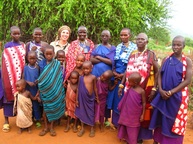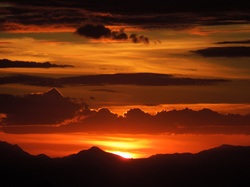
 Sunset from the Flat Rock in Chome
Sunset from the Flat Rock in Chome Most likely KIHO wants to set up a company that will benefit community projects as well as the further development of KIHO, thus it is again the rural communities in Same District that will benefit from eco-cultural tourism. One difficult thing will what this entity will do during the low season as we realize that established tourist places have a very hard time to get tourists during half of the year – or even more than that! It will be important to attract visitors throughout the year with an interesting program.
Ecological tourism means for us that we want to have a “light footprint” when our future tourists will come to Same and then go to the different villages. The environmental impact should be as minimal as possible although certain things like transport can hardly be avoided. KIHO will certainly promote in all villages tree planting as well as watershed management that will help to enrich and protect the bio-diversity but also increase the output of farmers thanks to less soil erosion and a better use of the water that is available.
KIHO understands cultural tourism as the promotion and the protection of the Pare culture, but also the Maasai culture in the lowlands of Same District. The sharing of life at home or on the farm, traditional dancers, traditional healers and story-telling can be a very valuable exchange of the local people with our visitors and it is an incentive for the rural communities to remember their heritage instead of giving it up.
In combination, eco-cultural tourism should be the chance for the local communities in the Southern Pare mountains to have additional income-generating opportunities through offering home stays for the visitors, perform dances, offer handicraft work or be tour guides during part of the year. Please, keep in touch with us with any ideas. And we count on you that you will help us to promote such kind of tourism in the Southern Pare mountains that will ultimately benefit our people and help them to get out of poverty.
 RSS Feed
RSS Feed
